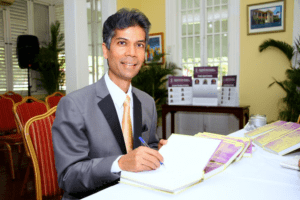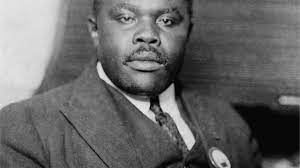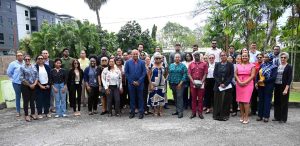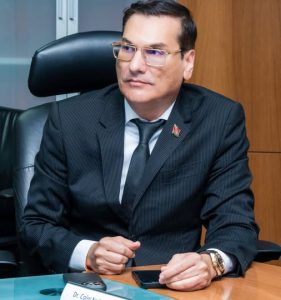
AS young men in Trinidad, both CLR James and George Padmore were familiar with the writings of WEB Du Bois and Marcus Garvey based in the USA.
The philosophy of Garveyism reinforced anti-colonial and anti-imperial sentiments, but more importantly it stimulated racial pride and self-reliance among Blacks.
Indeed, Garvey has been credited as laying the foundation for the struggles of the 1930s and subsequent political developments. To a certain extent, James in A History of Negro Revolt supported Garvey’s ideological stance. James credited Garvey’s monumental work in making the American Black more conscious of their African origin and developing the feeling of international solidarity among African and the diaspora.
Initially, James had admired the courage and indomitable spirit of Garvey and the value of his leadership to the African diaspora. However, James believed that Garvey’s African theories “had no sense” and his plan to return Blacks to Africa was “pitiable rubbish.”

Not surprisingly, during the late 1930s James and Padmore regularly heckled Garvey at ‘Speaker’s Corner’ in Hyde Park, England. However, Buhle surmised that both James and Padmore soon realised they had made “a political and personal blunder” by heckling Garvey.
In 1940 James, writing under the pseudonym J R Johnson, was critical of Garvey: “He used fierce words but he was opposed to the labor movement and counselled subservience to bosses. One reason for his success was that his movement was strictly a class movement.”
James also believed that Garvey should not merely be seen as an agitator but as building up a movement. Later, James would identify Garvey as promoting Black popular fascism which was comparable to Adolf Hitler of Germany.
Tim Hector argued that Garvey was hostile to most of the other Black activists/writers of that era. Furthermore, Hector felt Garvey wanted Africans to create a new civilisation based on European-American practices and ideas.
There were groups in England who were advocates of African interests and helped shape James’ Pan-Africanist ideology. Two such groups were the African Association founded in 1897 and the African Progress Union in 1921.
During the 1920s and 1930s other groups in existence included the Ethiopian Progressive Association. In Trinidad during the 1930s there were indicators of an African consciousness. For instance, there was the establishment of the African National High School at Park Street in Port-of-Spain which taught African language courses. Also in existence was the Daughters of Ethiopia which raised funds for such groups as the Ethiopian Red Cross.
In mid-1950s, James, whilst in London he met with Rev Martin Luther King, Jr, a charismatic Afro-American, who would later become an influential leader in the Civil Rights Movement in the United States. Both men discussed ideas to improve the conditions and lifestyle of Blacks.
Such discussion would have influenced James when he later returned to the United States and shared ideas with his group based in Detroit. This group would later produce Negro Americans Take the Lead (1964). Additionally, James had been in contact with and sought to influence the actions of LeRoi Jones (Amiri Baraka), a radical Afro-American, and one of the leading proponents of Black Power- Trinidad-born Stokely Carmichael (Kwame Ture). However, James was not able to adequately influence both personalities.
In addition to speaking invitations James was also in demand as a magazine writer and presenter on radio and television programmes. The senior editor of Africa Events requested a short article from James, dealing with the retirement President Julius Nyerere of the United Republic of Tanzania.
There were numerous requests for James as a speaker on issues relating to Africa. For instance, in December 1953 the secretary of the Cambridge University Students’ Club invited James to deliver a lecture on an African-related topic. Subsequently, James agreed to speak on “Africa and the Crisis of Modern Civilization” on January 17, 1954.
Almost two years later whilst residing in Spain, on March 17, 1958, James wrote to Jean Brierre in Port-au-Prince, Haiti, indicating that the group Société Africaine de Culture (Presence Africaine) was organising a second conference of African writers and those from the African diaspora to be held in Rome in September.
Subsequently, on 8 July 1958, the group invited James to deliver a presentation at this prestigious and exclusive conference. James was well-received at these public sessions.
Dr Jerome Teelucksingh is an activist. He initiated the inaugural observances of International Day for the Elimination of Violence Against Men and Boys (January 31) and World Day of the Boy Child (May 16). He has made academic presentations at tertiary institutions including Harvard University and Oxford University.
See other articles by Dr Jerome Teelucksingh on AZP News:
The Blackest Thing in Slavery wasn’t Slaves
The Importance of Emancipation Day
Tobago’s Working Class in the 1920s, 1930s
Are Humble Caring Fathers Champions?
Influencing West Indian Masculinity
Defining Caribbean Masculinity
Is Monogamy Encouraged in the Caribbean
Naps Girls: From Humble Beginnings to Excellence
US Media Creates Cultural Dependency in the Caribbean
Bloodless Revolution to Save Lives in Developing Countries
The Need for a Social and Moral Revolution
The Law of Supply and Demand in Developing Countries
End the Dependency for Developing Countries
T&T Carnival and the Emperor’s New Clothes
The Influence of Labour on Caribbean Integration
The illusion of political Unity
Presbyterians in Trinidad: Humble Missionaries, Local Workers
Religious Plurality: Curse or Blessing
Caribbean Youth Need Optimism, Patriotism
Rethinking Identities in Caribbean, Latin America
November 19: All Inclusive International Men’s Day
Should International Agencies be Blamed for Unemployment
A Need to Observe Word Unemployment Day
An Ideology for the Trade Union Movement
The Man who Couldn’t be Prime Minister
Social Outburst vs Social Revolution
Challenges of the Men’s Movement
If George Floyd was Denied Parole
The Meaning of Indian Arrival Day in T&T
International Men’s Day – A Way of Life
Wounds that cause school violence
May Day: A Time for Solidarity, Strength
Who Coined the Term ‘Black Power’
The illusion of political Unity
Presbyterians in Trinidad: Humble Missionaries, Local Workers
Religious Plurality: Curse or Blessing
Caribbean Youth Need Optimism, Patriotism
Rethinking Identities in Caribbean, Latin America
November 19: All Inclusive International Men’s Day
Should International Agencies be Blamed for Unemployment
A Need to Observe Word Unemployment Day
An Ideology for the Trade Union Movement
The Man who Couldn’t be Prime Minister
Social Outburst vs Social Revolution
Challenges of the Men’s Movement
If George Floyd was Denied Parole
The Meaning of Indian Arrival Day in T&T
International Men’s Day – A Way of Life
Wounds that cause school violence
May Day: A Time for Solidarity, Strength
Who Coined the Term ‘Black Power’
![]()













